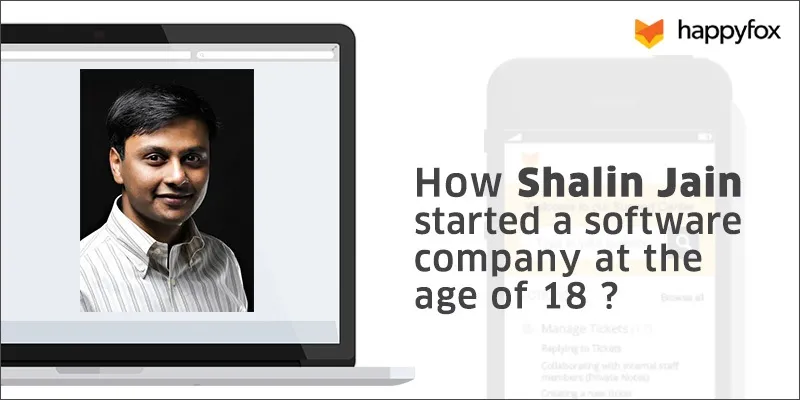Making a global product from the bedroom at 18: journey of Shalin Jain, founder Happyfox
In the recent decade, entrepreneurship has been on the rise and instead of securing plush corporate careers with MNCs Indians are taking up the entrepreneurial route at a very young age.
Over the past five years, the overall ecosystem for startups has improved remarkably with access to better infrastructure, mentorship, PR/media and of course capital pool among several others. But imagine the case of Shalin Jain (@Shalin10) who started his venture, Tenmiles (now Happyfox), a customer-support and help desk software from Chennai in 2000 while still in college.
At 18, Shalin was totally driven by the passion to create products that are loved all over the world. In 1999, when he was just 17, he had a job with a technology startup that had over 100 employees. “I was the youngest in the company and was working really hard. I started skipping every possible class that wasn’t interesting in college,” says Shalin. But soon his attendance in college fell short and he had to leave his part time job.

Within a week, Shalin got an offer letter from another company but he didn’t take that up as it was far from his house. “At that point starting up was the only option left for me and in 2000 I launched Tenmiles from my bedroom,” says Shalin. Tenmiles spun out it’s fastest growing product in customer service segment into a all new entity - HappyFox.
To unravel the entrepreneurial journey of Shalin, YourStory spoke to him over email and Skype. He spoke on various aspects like challenges while starting up in early 2000, shifting base to the US and his profound love for music and piano.
YS: You started very early (at 18) when the trend of starting up was not popular in India. What exactly motivated you?
SJ: One of the best programmers I knew in Chennai was my neighbour. I persuaded him to code an app for me. He worked with me only on weekends and helped me turn my first idea into a product. He also started his company during his college and I was in awe of the possibility of doing something like that.
YS: Take us through your journey so far as a techie and an entrepreneur.
SJ: I love to design and create useful products that appeal to larger markets. From our latest release, HappyFox, to our first product Screenswift in 2001, we have built a bunch of successful products that people love to use.
I grew tremendously from each product that we built and released. Every product we launched got better. Our early success got us lot of interesting people coming on-board.
Starting my company from my bedroom and making it global has been a memorable experience. But everyday it only feels like you have just started. There is so much more to learn and do.
As an entrepreneur, I have learnt that the most important assets of a company are its people and culture. Without having this done right you can just be another run-of-the-mill business.
YS: Tell us about your initial struggle and challenges?
SJ: I had to quit my day job to satisfy my university attendance requirements and keep my grades attractive for a fancy B-school entry. Soon after I quit, I had another offer waiting for me with more flexible work timings. But there was one silly thing stopping me from saying yes; the commute. Tenmiles (16 kms) was actually the distance I didn't want to travel for the job I got during my early college days. I know it sounds silly now but that made me start something of my own and call it, Tenmiles.
One of my biggest challenges was to hire for the product startup in the age of booming IT services businesses. But I started to approach the problem differently and I was able to find people from different avenues, with inclination to create meaningful products, the push to learn whatever is required to make a difference and not particularly be influenced by the attractive yet monotonous lifestyle of their peers.
YS: We hear that you love music and can play the piano. How do they help you in your work?
SJ: I loved playing the piano and writing music. It helped me stay focused and choose my way to express myself. I met some really amazing people and collaborated with them to make albums. In startup-speak, I got a co-founder and produced an album which we could never release. We started approaching music companies (I wish we had iTunes in 98-99) but just ended up pivoting to selling them as jingles for ads and also as a score for a documentary film. Isn't this so relatable to how tech startups pivot? I am happy I learnt doing this in high school.
YS: Last year, HappyFox moved to the US. What differences do you see in the organization after moving there from Chennai?
Shalin Jain: HappyFox is a customer-support and help desk software suitable for enterprises and startups. It is our flagship product and one of the fastest growing products that has come from Tenmiles. Most of our customers come from the US and there is lot of interest for our product from this part of the world. So it is natural that we moved there. We started operations here a year ago to serve our customers better.
We now meet our customers face-to-face, more often, and that alone has had a remarkable impact on our product and marketing strategy.
YS: How has the Indian startup ecosystem evolved over the past five years?
SJ: The ecosystem in India has emerged really well in the last five years. There are so many more events, meet ups, blogs and resources, co-sharing workspaces, awards, media attention, venture funding and overall the sheer volume of startups is remarkable. The growing ecosystem has made it easier for entrepreneurs to get the right kind of support, think big and achieve it.
YS: What lessons would you like to share with budding entrepreneurs?
SJ: -Don't be afraid to pivot your startup.
- Start selling as early as you can (even before your product launch) this helps you validate a lot faster.
- If your idea permits, build for the global market. Think global and act local.
- Make everyone in your startup participate in customer support.







